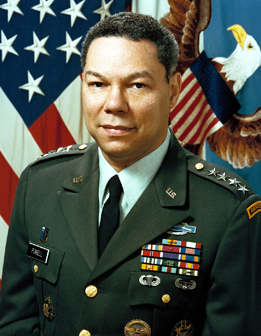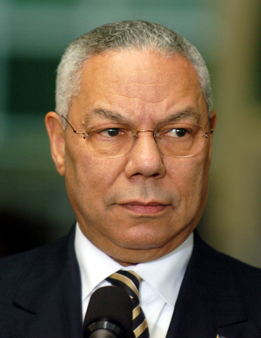
Sojourner’s Truth Staff
Colin L. Powell, the first Black person to serve as national security advisor, chairman of the Joint Chiefs of Staff and Secretary of State, died on Monday, October 18 of COVID-19 related complications.
“We have lost a remarkable and loving husband, father, grandfather and a great American,” Powell’s family said in its statement.
Powell’s career was marked by his involvement in some of the most significant international events of the last 60 years – the Vietnam War, the American invasion of Panama, then Iraq and the decision to invade Iraq a second time.
For all his achievements and success, Powell’s career is notable for one glaring misstep and, perhaps, one missed opportunity.
Colin Powell, 84, was born in New York City of Jamaican parents. He grew up in the South Bronx and graduated from City College of New York with decidedly unremarkable grades but found his calling when he joined the Army through the Reserve Officer Training Corps program.
He was commissioned s second lieutenant and, in 1962, was one of 16,000 “advisers” sent to South Vietnam by President John F. Kennedy. He would serve two tours of duty in Vietnam earning numerous decorations along the way.
Promotions followed. He served as a military assistant to Secretary of Defense Caspar Weinberger during the 1980s, became commander of the Army’s 5th Corps in Germany and was a national security assistant to President Ronald Reagan, helping to negotiate arms treaties and an era of “entente” with the changing Soviet/Russian leadership.
As chairman of the Joint Chiefs, Powell crafted the invasion of Panama in 1989 and led the Persian Gulf war in 1991, which ousted Saddam Hussein from Kuwait but left him in power in Iraq.
During his tenure as chief, Powell reshaped the American Cold War military machine and created what would be called the Powell Doctrine on military operations – the nation in the face of danger should outline clear political objectives, gain public support, use decisive and overwhelming force to defeat enemy forces and have a strategy for ending the conflict.
At the start of the gulf war, Powell stated of the military strategy: “Our strategy in going after this army is very simple; first, we’re going to cut it off, and then we’re going to kill it.”

Powell retired from the military in 1993 during the change of administrations but remained in the public eye during the President Bill Clinton years.
Then near the end of that administration came Powell’s missed opportunity. If Texas Governor George Bush might have feared one potential candidate for his party’s nomination, it would have been retired General Colin Powell. He had been approached by Republicans to run in 1996 but had demurred. He had written a best-selling memoir, My American Journey and was an extremely popular figure with numerous American of every political stripe. He apparently contemplated such a political move once more but, as was reported at the time, his family’s objections probably dissuaded him from entering the race.
After the Bush 2020 victory, he joined the new administration as the first Black Secretary of State, and then came the misstep. In the run-up to the U.S. invasion of Iraq, Powell went before the United Nations and, using faulty intelligence information, presented a case that Saddam Hussein and Iraq possessed weapons of mass destruction.
In 2008, Powell, who had served primarily Republican presidents, broke with that personal history and endorsed Barack Obama for president.
President Joe Biden released the following statement on Monday:
“General Colin Powell was a patriot of unmatched honor and dignity. The son of immigrants, born in New York City, raised in Harlem and the South Bronx, a graduate of the City College of New York, he rose to the highest ranks of the United States military and to advise four Presidents. He believed in the promise of America because he lived it. And he devoted much of his life to making that promise a reality for so many others. He embodied the highest ideals of both warrior and diplomat. He led with his personal commitment to the democratic values that make our country strong. He repeatedly broke racial barriers, blazing a trail for others to follow, and was committed throughout his life to investing in the next generation of leadership. Colin Powell was a good man who I was proud to call my friend, and he will be remembered in history as one of our great Americans.”
